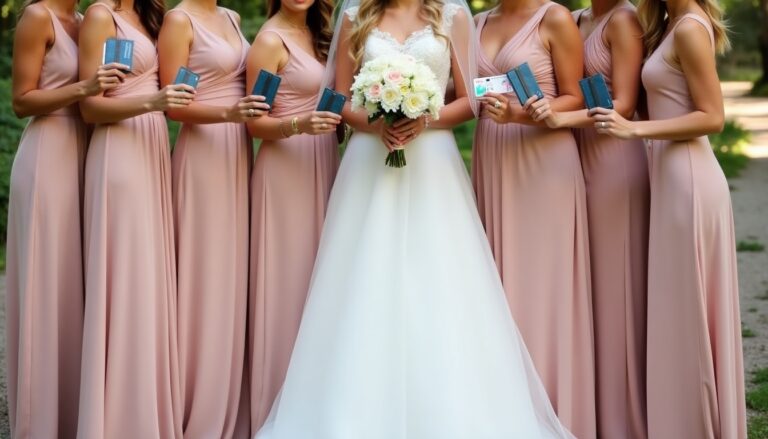Planning a wedding involves many financial decisions, including who covers specific expenses for the bridal party.
Understanding traditional etiquette while balancing modern expectations can help avoid awkward conversations and ensure everyone feels comfortable with their financial responsibilities.
This quick guide breaks down the typical expense arrangements for both traditional and contemporary weddings, helping couples and their bridal party members plan accordingly.
Traditional Bride’s Family Responsibilities
- Wedding dress and accessories
- Bridesmaids’ bouquets and flower girl petals
- Thank you gifts for bridesmaids
- Accommodations for bridesmaids (if required)
- Hair and makeup for bridesmaids (optional)
Traditional Groom’s Family Responsibilities
- Groomsmen boutonnieres
- Thank you gifts for groomsmen
- Accommodations for groomsmen (if required)
- Marriage license and officiant fees
Bridesmaids’ Expected Expenses
- Their own dress (typically $100-$300)
- Shoes and accessories
- Travel expenses to/from wedding
- Bridal shower contribution
- Bachelorette party expenses
Groomsmen’s Expected Expenses
- Tuxedo or suit rental/purchase ($150-$500)
- Travel expenses to/from wedding
- Bachelor party contribution
Modern Considerations
Many couples now choose to cover more expenses for their wedding party members, especially when requesting specific expensive attire or destination events.
| Expense Type | Traditional Payment | Modern Trend |
|---|---|---|
| Hair and Makeup | Bridesmaids | Often Bride |
| Wedding Attire | Wedding Party | Sometimes Couple |
| Travel Expenses | Wedding Party | Often Shared |
Tips for Managing Expenses
- Be upfront about expected costs early in the planning process
- Consider your wedding party members’ financial situations
- Offer flexible options for attire and accommodation
- Create a detailed budget spreadsheet to track expenses
- Consider group discounts for travel and accommodations
Communication Strategies
Have a clear discussion about expenses with each wedding party member before they accept the role.
Provide a written breakdown of expected costs and timing of payments.
Be open to finding cost-saving alternatives when needed.
Smart Planning Tips
- Book accommodations early for better group rates
- Research multiple vendors for best pricing on attire
- Consider rental options versus purchasing
- Look for package deals that include multiple services
- Plan events during off-peak seasons for better rates
Making It Work for Everyone
The key to managing bridal party expenses is finding the right balance between tradition and practicality.
Focus on creating a celebration that doesn’t create financial strain for anyone involved.
Remember that being part of a wedding party should be an honor, not a financial burden.
Alternative Cost-Saving Options
- Virtual pre-wedding celebrations to reduce travel costs
- Multi-purpose attire selections that can be worn again
- DIY options for accessories and decorations
- Group booking discounts for services
- Shared transportation arrangements
Special Circumstances
Destination Weddings
- Extended stay accommodation considerations
- Group travel packages
- Combined bachelor/bachelorette events
- Inclusive resort options
Multiple Wedding Events
- Cultural ceremonies
- Welcome dinners
- Post-wedding brunches
- Additional celebration costs
Digital Planning Tools
- Expense tracking apps
- Group payment platforms
- Shared planning documents
- Digital payment scheduling
Creating Lasting Memories Without Breaking the Bank
Focus on meaningful experiences rather than excessive spending. Consider what truly matters for your celebration and allocate expenses accordingly.
Remember that open communication, early planning, and flexibility are essential for maintaining positive relationships throughout the wedding planning process.
By balancing traditional expectations with modern practicality, couples can create a memorable celebration that respects everyone’s financial boundaries while honoring the special role of each wedding party member.
FAQs
- Who traditionally pays for the bridesmaid dresses?
Each bridesmaid typically pays for her own dress, shoes, and accessories unless the bride specifically offers to cover these costs. - What expenses should the bride cover for her bridesmaids?
The bride should cover professional hair and makeup if she requires it, as well as any specific accessories she wants them to wear like matching jewelry or robes. - Who pays for the bachelor and bachelorette parties?
The attendees split these costs, with the best man and maid of honor typically organizing and collecting money from other participants. The couple shouldn’t pay for their own parties. - Are groomsmen expected to pay for their own suits or tuxedos?
Yes, groomsmen traditionally pay for their own suits or tuxedo rentals, including accessories like ties and shoes. - Who covers the cost of bridal party transportation on the wedding day?
The couple should cover transportation costs for the bridal party on the wedding day, including any shuttles or limousines. - What about bridal shower expenses?
The maid of honor and bridesmaids typically host and split the costs of the bridal shower, though sometimes the mother of the bride or other family members may contribute. - Do bridesmaids pay for their own accommodations during the wedding?
Yes, bridesmaids are expected to pay for their own hotel accommodations unless the couple specifically offers to cover these costs. - Who pays for the rehearsal dinner?
Traditionally, the groom’s parents host and pay for the rehearsal dinner, including all costs for the bridal party members who attend. - What expenses should the maid of honor expect to cover?
The maid of honor typically covers her own attire, contributes to shower and bachelorette party costs, and may incur additional expenses related to her special duties. - Should bridesmaids pay for their own travel to the wedding location?
Yes, bridesmaids are responsible for their own travel expenses to and from the wedding location, unless otherwise specified by the couple.






